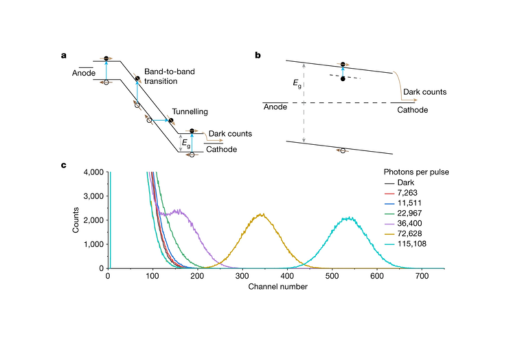Self-powered perovskite photon-counting detectors
Abstract
Metal-halide perovskites (MHPs) have been successfully exploited for converting photons to charges or vice versa in applications of solar cells, light-emitting diodes and solar fuels1,2,3, for which all these applications involve strong light. Here we show that self-powered polycrystalline perovskite photodetectors can rival the commercial silicon photomultipliers (SiPMs) for photon counting. The photon-counting capability of perovskite photon-counting detectors (PCDs) is mainly determined by shallow traps, despite that deep traps also limit charge-collection efficiency. Two shallow traps with energy depth of 5.8 ± 0.8 millielectronvolts (meV) and 57.2 ± 0.1 meV are identified in polycrystalline methylammonium lead triiodide, which mainly stay at grain boundaries and the surface, respectively. We show that these shallow traps can be reduced by grain-size enhancement and surface passivation using diphenyl sulfide, respectively. It greatly suppresses dark count rate (DCR) from >20,000 counts per second per square millimetre (cps mm−2) to 2 cps mm−2 at room temperature, enabling much better response to weak light than SiPMs. The perovskite PCDs can collect γ-ray spectra with better energy resolution than SiPMs and maintain performance at high temperatures up to 85 °C. The zero-bias operation of perovskite detectors enables no drift of noise and detection property. This study opens a new application of photon counting for perovskites that uses their unique defect properties.
Citation
Zhou, Y., Fei, C., Uddin, M. A., Zhao, L., Ni, Z., & Huang, J. (2023). Self-powered perovskite photon-counting detectors. Nature, 616(7958), 712–718. https://doi.org/10.1038/s41586-023-05847-6


